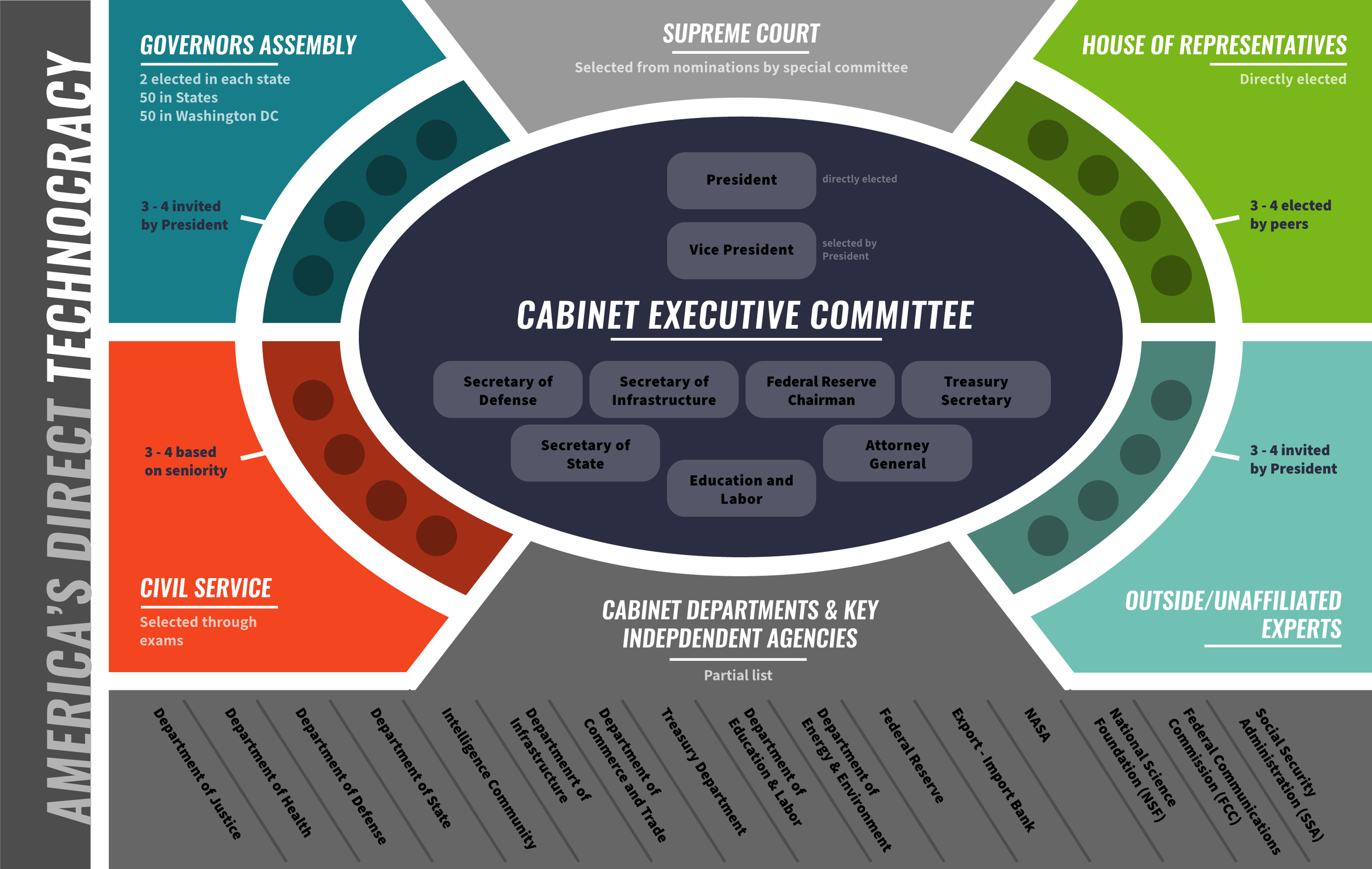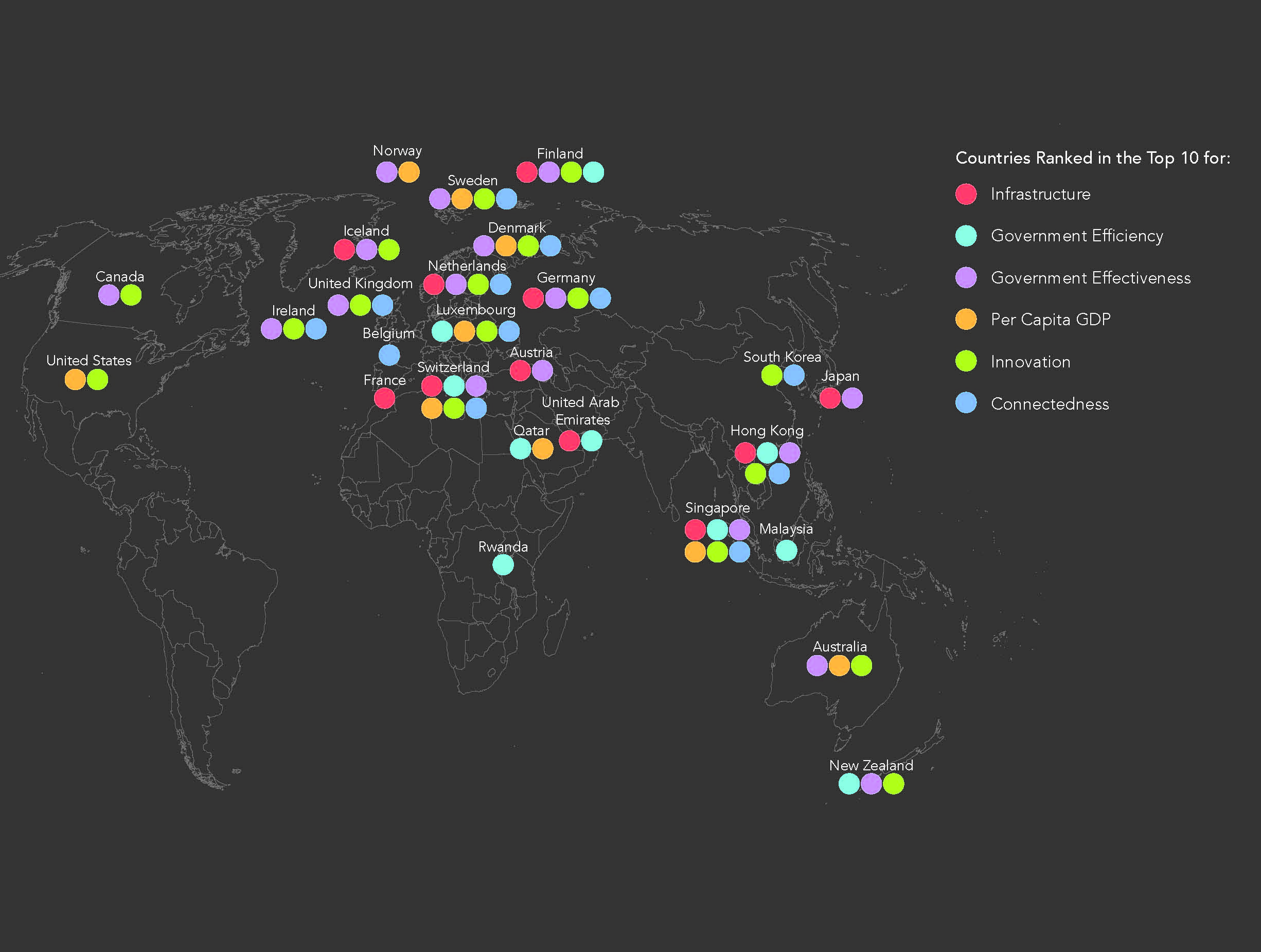TECHNOCRACY IN AMERICA: Rise of the Info-State

American democracy just isn’t good enough anymore. A costly election has done more to divide American society than unite it, while trust in government—and democracy itself—is plummeting. But there are better systems out there, and America would be wise to learn from them. In this provocative manifesto, globalization scholar Parag Khanna tours cutting-edge nations from Switzerland to Singapore to reveal the inner workings that allow them that lead the way in managing the volatility of a fast-changing world while delivering superior welfare and prosperity for their citizens.
The ideal form of government for the complex 21st century is what Khanna calls a "direct technocracy," one led by experts but perpetually consulting the people through a combination of democracy and data. From a seven-member presidency and a restructured cabinet to replacing the Senate with an Assembly of Governors, Technocracy in America is full of sensible proposals that have been proven to work in the world’s most successful societies. Americans have a choice for whom they elect president, but they should not wait any longer to redesign their political system following Khanna’s pragmatic vision.
Now available on Amazon.com Click here for Mandarin edition Click here for German edition Click here for Italian edition
Praise for Technocracy in America:
"What can America learn from the more technocratic governments in today's world? I don't agree with everything in this book, but it is one of the most important and urgent rethinkings of what has gone wrong in the United States."--Tyler Cowen, Professor of Economics, George Mason University, and author, Average is Over
"Parag Khanna does it again, brilliantly pushing the boundaries of how we must rethink technocracy and democracy in our densely connected, rapidly changing and radically contingent world. And in such a world we will need a new generation of technocrats who are well versed in complexity science and deep listening skills. This book should be read by all of us especially in light of our recent experiences picking our next president."--John Seely Brown, Former Chief Scientist, Xerox Corporation and Director of Xerox Palo Alto Research Center (PARC)“I love bold and crazy arguments--especially when (essentially) correct. TECHNOCRACY IN AMERICA is all that. Parag Khanna’s essential thesis is that America’s government is fatally broken -- fatal for our society, not for the government. He argues for a radical change in how America is governed -- less democracy, and more governance…. I completely agree with the diagnoses and the urgency in finding a remedy… Suspend the sensible judgment that everything he’s describing is politically impossible--because the end he is arguing for (a government that can actually govern for the public’s good) is absolutely necessary. We are nowhere close to having one now, regardless of the President.”--Lawrence Lessig, Professor, Harvard Law School
"American democracy is broken. But the best political practices of other countries can fix it. Read this book tofind out how!"--Daniel Bell, author of The China Model and Dean, Faculty of Politics and Public Administration, Shandong University"Parag has produced yet another thoughtful and provocative masterpiece. His insights on technocracy, which focuses on performance rather thanpolitics, stems from an astute and up-close observation of theSingaporean and Swiss systems, and he is among the very few who has this unique vantage point. I would highly recommend this book to anyone whowants to understand how to run a high-performing country ororganisation. It will be one of the best investments you'll ever make."--Tan Yinglan, Venture Partner, Sequoia Capital, and author, The Way of the VC
A radical reappraisal of democracy and its decline in the United States. After a historically acrimonious presidential election, there’s been much hand-wringing about the health of American democracy on both sides of the ideological divide, and consternation over a general lack of adequate political representation. Khanna (Connectography, 2016, etc.), a senior fellow at the Lee Kuan Yew School of Public Policy at the National University of Singapore, argues that American democracy has become indefensibly dysfunctional, and that it’s eroding the public’s trust in its chief institutions. The real goal, the author contends, should be a combination of meaningful representation with effective governance—one that requires a diminishment of democracy in favor of technocratic stewardship: “In western thought, a deep complacency has set in that confuses politics with governance, democracy with delivery, process with outcomes,” he notes. “But the ‘will of the people’ is not just to repeat their desires over and over without results.” Khanna recommends a combination of democracy and meritocratic rule—“direct technocracy”—which would chasten the demands of an often myopic public with the long-term judgment of the nation’s “best and brightest.” The author’s model for direct democracy is Switzerland’s, while his exemplar of technocratic oversight is Singapore’s, and he ably discusses both. Philosophically speaking, a combination of the two, he says, would encourage utilitarian outcomes that would ultimately generate the broadest benefits for the greatest number of people. The author provocatively offers a laundry list of governmental innovations to this end; the most notable and ambitious include the leadership of an executive committee instead of a single president; 10-year-terms for U.S. Supreme Court justices; and the replacement of the U.S. Senate with a “Governors Assembly.” Khanna’s judgments are sometimes peremptory and strident; for instance, he assumes, without argument, that Brexit is a “debacle” that represents “the triumph of politics over rationality.” Also, he asserts, when discussing the executive branch, that “Seven heads are better than one, period,” without referring to Alexander Hamilton’s arguments for a unified executive branch. Still, this book remains a powerful stimulant to a more searching discussion of the virtues and vices of American democracy, and it deftly combines philosophical discussion with concrete political analysis. A refreshingly original contribution to the ongoing analysis of the American political system.--Kirkus Reviews
"If we could start from scratch, how would we design the U.S. government? Would we preserve the electoral college, the18th-centurycreation that is so controversial today? Would we keep the Senate or the Supreme Court? According to Parag Khanna, an author known for pushing boundaries, the answer is no. In a new book, Technocracy in America: Rise of the Info-State, Khanna takes on the task of radically redesigning the U.S.government for the 21st century."--Ana Swanson, Washington Post
Technocracy in America: Rise of the Info-State presents a common contention: that American democracy is broken. But, unlike most competing books, global scholar Parag Khanna looks beyond American shores for solutions to fixing it in an unexpected move that allows for some unusual perspectives. There are more 'technocratic' democracies in the world than the U.S., and their processes and successes hold many insights into America's political and social woes. Khanna's decades of living in other countries and studying their political arrangements leads to a book that advocates not a return to the past, but a forward-thinking vision where leaders would jointly manage the executive branch and where governors could unite in an entity that would enjoy more immediate powers and results than our current Congress. The author's close-up observations of how the successful Singaporean and Swiss systems work forms the foundation not of a set of ideals and dreams, but for the basics of a working democratic process that has already been tested and fine-tuned, abroad. What factors connect these very different systems? "...what matters most is that Switzerland and Singapore are both verifiably democratic and rigorously technocratic at the same time. They both have a high percentage of foreign-born populations, national military and civil service, strong linkages between education and industry, diversified economies, and massive state investment in R&D and innovation." Other nations who can't afford to experiment with political processes have already identified their strategic niches and have put innovations into place that apply their inherent niche assets in new ways on the global arena. Technocracy in America may sound radical in some of its concepts, but its appearance represents perfect timing for America's new government, which stands poised on the brink of revolutionary changes. Should they go in the direction of this book, many might come to believe that democratic processes could be preserved and enhanced, bringing the nation up to speed in a technocratic environment which other democratic nations of the world are already successfully navigating. Political and social science students, as well as concerned general readers, will find Technocracy in America satisfyingly specific in its examples and democratic in its focus, offering a different approach to change that acknowledges and enhances past successes while looking forward to a future that embraces technology and democracy in a different manner. --Diane Donovan, Midwest Book Review

